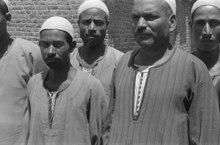Fellah
This article possibly contains original research. (March 2019) |

Fellah (Arabic: فلاح fallāḥ; feminine فَلَّاحَةٌ fallāḥatun; plural fellaheen or fellahin, فلاحين, fallāḥīn) is a peasant, usually a farmer or agricultural laborer in the Middle East and North Africa. The word derives from the Arabic word for "ploughman" or "tiller".
Due to a continuity in beliefs and lifestyle with that of the Ancient Egyptians, the fellahin of Egypt have been described as the "true Egyptians".[1]
A fellah could be seen wearing a simple Egyptian cotton robe called galabieh (jellabiya). The word galabieh originated around 1715–25 and derived from the Egyptian slang word gallabīyah.
Origins and usage[]

Fellahin was the term used throughout the Middle East in the Islamic periods and later to refer to native villagers and farmers.[2] Nur-eldeen Masalha translates it as "peasants".[3]
Fellahin were distinguished from the effendi (land-owning class),[4] although the fellahin in this region might be tenant farmers, smallholders, or live in a village that owned the land communally.[5][6] Others applied the term fellahin only to landless workers.[7]
In Egypt[]

After the Arab conquest of Egypt, they called the common masses of indigenous peasants fellahin (peasants or farmers) because their ancient work of agriculture and connecting to their lands was different from the Jews who were traders and the Greeks (Rum in Arabic), who were the ruling class. With the passage of time, the name took on an ethnic character, and the Arab elites to some extent used the fellah synonymously with "indigenous Egyptian". Also when a Christian Egyptian converted to Islam he was called falih which means "winner" or "victorious".
Most urban Egyptians are considered to be fellahin but see the term as offensive and so prefer to call themselves Masriin ("Egyptians") instead.
Comprising 60% of the Egyptian population,[8] the fellahin lead humble lives and continue to live in mud-brick houses like their ancient ancestors.[1] Their percentage was much higher in the early 20th century, before the large influx of Egyptian fellahin into urban towns and cities. In 1927, anthropologist Winifred Blackman, author of The Fellahin of Upper Egypt, conducted ethnographic research on the life of Upper Egyptian farmers and concluded that there were observable continuities between the cultural and religious beliefs and practices of the fellahin and those of ancient Egyptians.[9]
In the Levant[]
In the Levant, the term fellahin also refers to non-Arabic Semitic peoples such as the Arameans.[10] The term fallah was applied to native people from several regions in the North Africa and the Middle East, also including those of Cyprus.
See also[]
References[]
- ^ a b Pateman, Robert & Salwa El-Hamamsy (2003). Egypt. New York: Marshall Cavendish Benchmark. p. 54. ISBN 9780761416708.
- ^ Mahdi, Kamil A.; Würth, Anna; Lackner, Helen (2007). Yemen Into the Twenty-First Century: Continuity and Change. Garnet & Ithaca Press. p. 209. ISBN 9780863722905.
- ^ Masalha, Nur (2005). Catastrophe Remembered: Palestine, Israel and the Internal Refugees: Essays in Memory of Edward W. Said (1935–2003). Zed Books. p. 78.
- ^ Warwick P. N. Tyler, State Lands and Rural Development in mandatory Palestine, 1920–1948, Sussex Academic Press, 2001, p. 13
- ^ Hillel Cohen, Army of Shadows: Palestinian Collaboration with Zionism, 1917–1948, University of California Press, 2008, p. 32
- ^ Sandra Marlene Sufian, Healing the Land and the Nation: Malaria and the Zionist Project in Palestine, 1920–1947, University of Chicago Press, 2007, p. 57
- ^ Michael Gilsenan, Lords of the Lebanese Marches: Violence and Narrative in an Arab Society, I. B. Tauris, 2003, p. 13
- ^ "Who Are the Fellahin?" Biot #312: December 24, 2005. SEMP, Inc.
- ^ Faraldi, Caryll (11–17 May 2000). "A genius for hobnobbing". Al-Ahram Weekly. Archived from the original on 1 December 2017. Retrieved 30 November 2017.
- ^ Smith, George Adam (1918). Syria and the Holy Land. George H. Doran company. p. 41.
fellahin syria.
External links[]
| Wikimedia Commons has media related to Fellahs. |
- Egyptian farmers
- Indigenous peoples of North Africa
- Social history of Egypt
